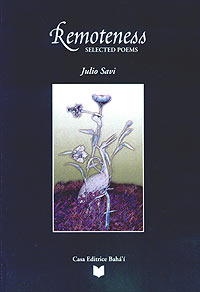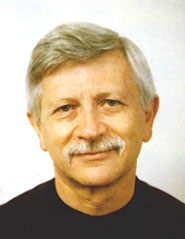BAFA © 2010. All material here is copyrighted. See conditions above. |
Julio Savi
poet, academic, Italy.
|
 Remoteness
Remoteness, 2002,
|
Remoteness by Julio Savi is a collection of 10 unpublished books of poems written since 1956. This volume (also printed in an Italian edition) presents 187 of these poems, recently translated from the original Italian, by the author himself. The foreward contains a short essay by Leila Mesbah Saberan and the poems are followed by some notes, quotations, background information, etc. Many poems contain or start with a quotation from the Bahá´í Writings.
Julio Savi chose to translate these into English because "...in its 1990 Ridvan message the Universal House of Justice had encouraged the Bahá´ís to 'emblazon' the name of Baha in view of the incoming centenary of His passing. And if my poems could ever hope to add some day a jot to this 'blazon', I ought to make an attempt to translate them into English... (so that it) could address much wider audiences..." |
Order the book from
Casa Editrice Bahá´í, Via Filippo Turati 9, 00040 Ariccia, Italy.
Fax: 06/9334335 Email: cep@Bahá´í.it for 20 Euros plus postage.
Julio Savi is author of these books:
Bahhíyyih Khánum, Ancella di Bahá (Bahhíyyih Khánum, Maid of Bahá), Rome, 1983; The Eternal Quest for God, Oxford, 1989; Per un solo Dio (For the Sake of One God), Rome, 2000; and various papers on spiritual and religious themes in the Bahá´í Studies series published by George Ronald, Oxford, in Encyclopé die philosophique universelle, Universitaires de France, and in the journals Opinioni Bahá´í, Rome, World Order, Wilmette, The Journal of Bahá´í Studies, Ottawa, and The Bahá´í Studies Review, Oxford.
|
 Julio Savi
Julio Savi, 2002
|
Email Julio Savi at: ascanio@iol.it
I began to write poetry as a child as a means for portraying my most intimate feelings. My Italian classical studies have had a great influence on my poetic vein. Eight years of studies of Italian, Latin and Greek languages and literatures, as well as history, history of philosophy and history of arts during my adolescence helped me to appreciate the value of ideas, words and verses.
Another great influence has been the unspoiled natural beauties of Eritrea, the African country where I was born and lived until I was 22 years old. Eritrea turned in my imaginary world into the land of spirit and "reunion with the Beloved," whereas Europe, with its industrialized civilization, appeared as the land of materialism and "remoteness from the Beloved."
|
I came to Italy in 1960 as a medical student but actually as a Bahá'í pioneer, in response to Shoghi Effendi's instruction to the Bahá´í pioneers who had asked permission to teach the Faith to the Italians living in Eritrea. He told them: teach them the Faith, only if they ask you. But if they accept the Faith, tell them to go to their country and teach the Faith there. And thus I decided to continue my medical studies in Italy. My medical profession has brought me in touch with very intimate thoughts and feelings of human hearts and this experience has trained my sensitivity and enriched my inner universe.
For many years my poems were a personal affair. I seldom shared them, and only with very intimate friends. Those friends tried to convince me to publish them, but I was reluctant, because I felt that my poems might be an act of "self-indulgence," rather than of worship, so I was not sure that they could be useful to others. Those fears were overcome in the early 90s, as described in "You Come Back, O Poetry"
I recognize the aesthetic influence of a few Italian poets: the poets of the Dolce stil novo (Italian thirteenth and fourteenth century movement), specially Dante Alighieri (1265-1321) and his Vita nuova (New life), Petrarch (1304-1374), Giacomo Leopardi (1798-1937), Giuseppe Ungaretti (1888-1970). I appreciate the balance between their simple, but formally perfect and pure language and the spiritual, intellectual and emotional depth of their thoughts and feelings. My latest poems have also been influenced by Sufi poetry, in particular by Rúmí and Háfiz. My poetry is deeply influenced by the Bahá'í Writings. The challenges of life are always met in the light of its teachings, even when the frailest aspects of human nature come to forefront.
I have translated my poems into English not only because I love English,
associated as it is in my mind with the Bahá'í Writings, which I first read
and studied in that language, but mainly because in 1990 the Universal House of Justice encouraged Bahá'ís to "emblazon" the name of Bahá'u'lláh in view of the incoming centenary of His passing. And if my poems could ever hope to add some day a jot to this "blazon," I ought to make an attempt to translate them into English, a language that can reach a much wider audience than Italian.
My poems try to describe the relation between the soul and her Lord, the love toward the Friend and the friend. In the foreword of the book "Remoteness", Mrs Leïla Mesbah Sabéran describes my poems as having "(s)implicity and conciseness... (s)tripped of embellishments, ridden of artifices . . . (t)his sober, never overburdened, work, reveals a conscious choice: that of a deliberate and laboriously pursued simplicity"
Remoteness is a selection of 187 poems originally written in Italian between 1955 and 2001
(and translated into English between 1990 and 2001).
It is divided into ten sections. The poems of the first "I Shall Be Free Once Again," describe a soul searching for the Absolute and finally discovering it in the Bahá'í Faith. The poems of "Unfulfilled Dreams" describe the awareness that one's enrolment as a Bahá'í is only the beginning of a long struggle to conform one's soul to Bahá'u'lláh's Teachings.
Arts Dialogue, November 2002, page 5.
...a few poems to come...
|

Arts Dialogue, Dintel 20, NL 7333 MC, Apeldoorn, The Netherlands
email: bafa@bahai-library.com
|
|

